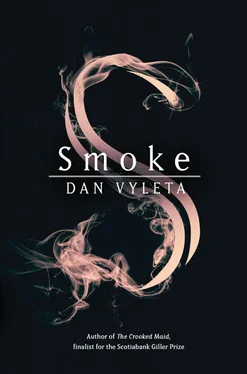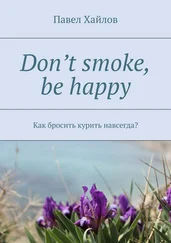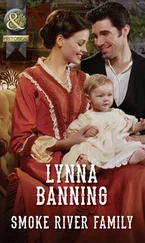The cloud of Smoke, heavier than air and hungry for converts, descends into the crowd. You can watch it spread by the yard. In less than a minute it has reached Charlie. It’s like breathing in a drug: his heart begins to pound in his chest, his senses open themselves to the crowd. He ceases to think in terms of good and evil, he wants to see the woman die, wants the noose to break her neck, for the sheer thrill of it. And at the same time he admires her, hopes she will drag the executioner down with her, through the trapdoor under her feet; is ready to riot, tastes his own Smoke, grey and feeble on his tongue, and for the first time in his life enjoys its flavour.
All around him the chant continues—“Murderer, murderer”—but a new note has emerged in it, as accusation transforms into salute. Charlie tries it, quietly at first, then louder and louder: “Murderer, murderer.” He feels the joy of being one with the crowd, wants to share it with Thomas, wants to link arms with him and run riot, mingle Smokes, and partake of his friend’s sin.
But when he looks, Thomas is no longer there.
ф
Afterwards, back at school, lying awake on his bed, Charlie will be pleased to realise that his concern for his friend was stronger even than the woman’s Smoke. A breeze helps him, too, blowing in from behind. It shifts the centre of madness to the other side of the square. The executioner, his features twisted into a mask of hate, is kicking the woman, then throws his weight against the lever that triggers the trapdoor. Charlie turns and breaks his connection with the gasping crowd. He hopes Thomas is behind, away from all this, in safety. But it is hard to make out any one person in this ocean of faces, all trained in the same direction, all blackened and mean. He spins, catches a sickening glimpse of her body, dancing, twisting at the end of the rope, looks in all directions and sees nothing but the heaving, shouting mass, all individuality dissolved, each face reflecting the emotion of its neighbours and retaining little feature of its own.
Then his mind snags on someone, the way a fingernail may catch on fabric. It isn’t Thomas, and he does not know him, but all the same his separateness commandeers Charlie’s attention. It isn’t immediately obvious why. The man is in his forties or thereabouts; stout but not fat; the head sloping sideways, like he’s twisted his neck. A face like a dozen others; his clothes shabby and stained. And yet he stands apart. It’s his movement, for one thing. Like Charlie’s, his eyes are not on the execution. He is slinking through the crowd, trying to exit the square unobtrusively, pushing past those who will move aside and rounding those who won’t. Something else, too. It takes Charlie the longest time to see it. He is not smoking. Smoke surrounds him, Soot clings to him in streaks and blotches. But he: he is not smoking. When he passes not two feet from Charlie, the boy, taller by some inches, sees the man’s neck, where its sideway crick exposes the inside of his collar. It is clean, though the outside is quite black. As though feeling a stranger’s gaze on him, the man pulls at his loosened handkerchief, ties it tightly around his throat. In another moment he has reached the edge of the crowd and is walking more boldly, away.
Charlie hesitates. He wants to chase the man (not chase, says the Smoke that’s coursing through his blood: hunt ), but he is worried about Thomas; glances around for him with no success. Then he is gone, the man who did not smoke; swallowed up by the city.
Charlie spins and looks and pushes, all to no avail. As the press around him eases, it’s becoming less difficult to move and at the same time harder to see, bodies shifting across his field of vision. Within minutes there is a general movement outward: the crowd disperses, a strange kind of exhaustion in their faces. Charlie realises that it is over. The woman is dead, cut down from the gallows. The spectacle has run its course. Thick flakes of Soot are floating in the air like snow; living evil has turned into mere dirt. As the townspeople leave — to work? to tea? — the only figures remaining on the square are some sixty schoolboys in blackened uniforms and the small huddle of their teachers. As for Thomas, Charlie finds him on his hands and knees, not far from the scaffold, retching. He walks over to him, crouches, waits for Thomas to look up.
“Quite a Trip this,” he says at last, as lightly as he can.
Thomas nods, spits, smiles. “Yeah. Not bad.”
But his eyes are full of fear.
ф
They walk the city for several more hours, visit a bottle blackening factory, and admire the grand husk of Buckingham Palace, now locked up and abandoned. A factory bell marks the end of a shift, and Julius, against Renfrew’s instruction, stops a flower girl and buys a bouquet, then presents it back to her with a gallant bow. Not even his cronies grant him applause: the boys have withdrawn into themselves, walk in a state of nervous exhaustion. Smoke continues to waft through the air, but it is lighter now, or else Charlie has gotten used to the feel of his own meanness. There is no lunch or dinner, but neither students nor teachers complain. They have but one need: to go home.
On the way back to the train a group of men passes them, in good if Soot-stained clothing, holding rolls of charts under their arms and protected from the crowd by the ministrations of two burly servants who clear the way with the liberal use of their elbows and arms. Renfrew tips his hat to the well-dressed men, and they tip theirs, look after the boys for a moment, before moving on.
They ride the train in silence. Inside the compartment it is very dark. The gas lamps have not been lit, whether by oversight or on purpose it is hard to say. Some whispers travel, boys with their heads thrown together, in conspiracy and shame. A few boys are crying, quietly, their faces to the window. Charlie can tell because of how still they hold themselves. Thomas, too, keeps his face averted. Charlie would like to ask his friend how he is feeling; how it was that they got separated at the market square and what it was that made him sick. He would like to tell him about the miracle he, Charlie, witnessed. A man without sin; crooked about the neck. Just thinking about it makes his heart pound with hope.
But Charlie does not trust himself to speak. A trace of Smoke remains in his blood, feeds a feeling of irritation and impatience. He’s afraid it will show in his voice. There is more to it yet. Charlie’s whole sense of who he is lies disturbed and the calm that returns to him feels strange, like a mask grown stiff from want of use. When he finally does speak, his voice surprises him, is gentle, unchanged.
“We look like miners, coming back from a shift” is what he says. He has been looking at his hands. The skin beneath his fingernails seems unnaturally pale next to his blackened fingers.
Thomas turns, cheeks shiny with Soot. There are no tear tracks linking eye and jaw.
“There was someone there,” he says. “Underneath the scaffold.”
“ Under the scaffold? Who?”
“Don’t know. A man. He was stripping the dead woman’s body.”
“Stripping her.” Charlie’s mind recoils from the image. “For valuables?”
Thomas shakes his head, glowers at the memory.
“For her Soot.”
He turns his face back to the window before Charlie can ask him to explain.
ф
At Oxford station the lights are burning. The boys take stock of one another. They are, each of them, splattered with sin. Renfrew and the other teachers do a head count, the third since the execution square. It is a miracle they have not lost anyone. A porter leads them to a room at the far end of the platform. Behind the double doors yawns a bathroom twice the size of the one in school. Four rows of shower-baths stand in military formation. Some gas lamps are lit but turned down very low. On a counter there sit a hundred little towels, neatly folded and piled chest high. Renfrew crosses the room, opens a metal hatch on a large stove in the corner. A fire roars beyond. The heat is so intense he retreats two steps before speaking.
Читать дальше












